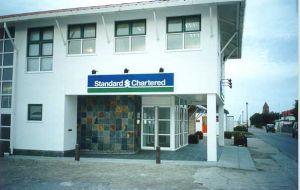MercoPress. South Atlantic News Agency
Standard Chartered Bk calls for Sovereign Funds code of practice
 Falklands' Standard Chartered Bank branch is operating since 1983
Falklands' Standard Chartered Bank branch is operating since 1983 The influence of Sovereign Wealth Funds, SWF, on global financial markets is set to grow as the world economy shifts to emerging economies, and Western countries should seize the opportunity to find common ground rules and a code of practice, recommends a report on SWF from Standard Chartered Bank.
The report estimates that the SWFs are currently valued at US$2.2 trillion and if their current rapid pace of growth can be sustained then in 10 years time SWFs could soar to US$13.4 trillion. "We expect these government controlled funds to take bigger financial stakes in equity and bond markets across emerging economies, to feed more money into alternative investments such as hedge funds and private equity, to boost strategic links with countries that have not shared fully in the benefits of globalization or which have been shunned by the West, and to take more strategic stakes in sensitive areas within developed countries", said Standard Chartered chief economist Gerard Lyons on introducing the report on the activities of the world's top twenty SWF. "Western countries may need to accept the rise of SWFs as a further sign of a shift in the world economy and should seize this as an opportunity to work with emerging economies such as China and Russia, countries in the Middle East and others to find common ground rules and a code of practice", he added. The report has been carried out with support from Oxford Analytica to ensure an independent perspective, as some SWFs are shareholders in Standard Chartered. The study identifies 20 SWFs which are mainly investment funds owned by a sovereign nation states. There is a group of 'super seven funds' each with over 100 billion US dollars in assets. These are: Abu Dhabi, GIC of Singapore, Norway, Kuwait, China, Russia and Temasek. The report also highlights that there is a strong case for SWFs to adopt the best practice of open funds like Norway. But many governments will argue that it is their money and why should they be so transparent when so many other areas of financial markets are not. In addition there is a strong case to be made to encourage the opening up of markets from which SWFs emanate (the so-called level playing field). If not, then protectionist pressures will come to the fore, risking a clash between Western governments and SWFs. Already this is happening in the US, with more signs of a hardening of stances across Europe. Transparency of SWFs in terms of their size, portfolio composition and investment return is also covered in the report. Those which are transparent include Norway, Temasek (Singapore), Alaska (US), Malaysia, Alberta (Canada) and Azerbaijan. Those with relatively low level of transparency include UAE funds, Kuwait, China, Qatar, Brunei, Venezuela, Taiwan and Oman. Standard Chartered PLC, listed on both the London Stock Exchange and the Hong Kong Stock Exchange, ranks among the top 25 companies in the FTSE-100 by market capitalization. The London-headquartered group has operated for over 150 years in some of the world's most dynamic markets, leading the way in Asia, Africa and the Middle East. It has a limited presence in Latinamerica but also, of all places and for a quarter century, a fully licensed branch in the Falkland Islands. Its income and the number of employees have more than doubled over the last five years primarily as a result of organic growth and supplemented by acquisitions. Standard Chartered PLC recently acquired American Express Bank Ltd, AEB, a subsidiary of American Express Company, AXP, which is an international bank present in 47 countries in the world. The acquisition provides an opportunity to double the size of the bank's US dollars clearing business and provide a direct Euro and Yen clearing capability plus enhances the network with valuable branch licenses from India and Taiwan. Earlier this year Standard Chartered launched its private banking business in 10 locations in seven countries in Asia and the Middle East targeting a pool of high net worth individuals (HNWIs) estimated at about 3 million, about a third of the global total. The private banking launch, one of the biggest ever globally, gave the bank 150 relationship managers. AEB's private bank arm has over 10,000 customers and had $22.5 billion in assets under management at the end of last year. Standard Chartered and many of its rivals have pinpointed private banking for expansion as it has been the fastest-growing area of financial services in recent years. The group now employs over 65,000 people, representing some 100 nationalities, in more than 1,400 branches located in over 50 countries. The bank generates more than 90 per cent of its profits from Asia, Africa and the Middle East, with balanced income derived from both Wholesale and Consumer Banking.


Top Comments
Disclaimer & comment rulesCommenting for this story is now closed.
If you have a Facebook account, become a fan and comment on our Facebook Page!